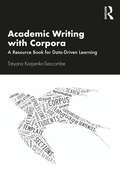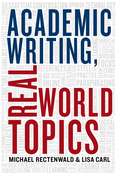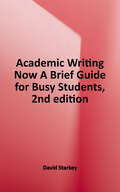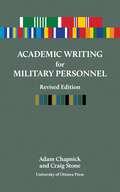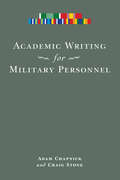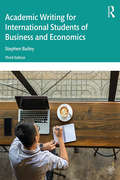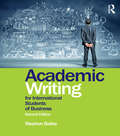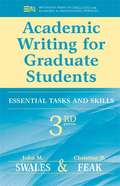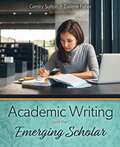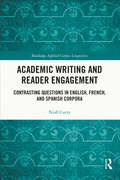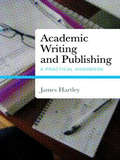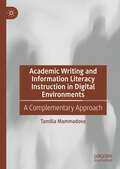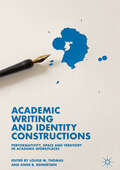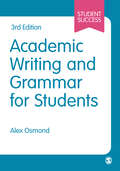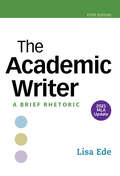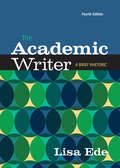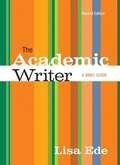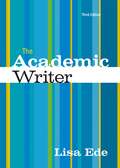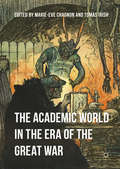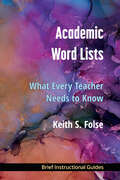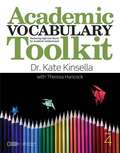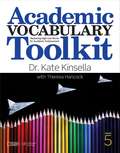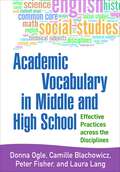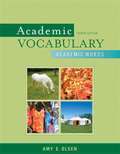- Table View
- List View
Academic Writing with Corpora: A Resource Book for Data-Driven Learning
by Tatyana Karpenko-SeccombeAcademic Writing with Corpora offers a step-by-step accessible guide to using concordancers and aims to help introduce data-driven learning into the academic English classroom. Addressing the challenges faced by EAP teachers when explaining to their students how to write 'naturally', this book provides a solution to the problem by placing an emphasis on learning from expert and proficient writing. In doing so, it: takes a highly practical approach; uses Lextutor, an easy-to-use, open access concordancer, whilst introducing students to tools, such as SkELL, MICUSP and BNC-English Corpora; fosters autonomous learning by demonstrating how to solve everyday difficulties in word choice and grammar; helps teachers to use corpora in teaching proficient writing and helps students to improve their academic writing by learning from the best examples in their field; guides students towards better awareness of the communicative side of academic writing. This book forms essential reading for all students on academic writing and EAP courses or who wish to improve their writing.
Academic Writing, Real World Topics
by Michael Rectenwald Lisa CarlAcademic Writing, Real World Topics fills a void in the writing-across-the-curriculum textbook market. It draws together articles and essays of actual academic prose as opposed to journalism; it arranges material topically as opposed to by discipline or academic division; and it approaches topics from multiple disciplinary and critical perspectives. With extensive introductions, rhetorical instruction, and suggested additional resources accompanying each chapter, Academic Writing, Real World Topics introduces students to the kinds of research and writing that they will be expected to undertake throughout their college careers and beyond. Readings are drawn from various disciplines across the major divisions of the university and focus on issues of real import to students today, including such topics as living in a digital culture, learning from games, learning in a digital age, living in a global culture, our post-human future, surviving economic crisis, and assessing armed global conflict. The book provides students with an introduction to the diversity, complexity and connectedness of writing in higher education today. Part I, a short Guide to Academic Writing, teaches rhetorical strategies and approaches to academic writing within and across the major divisions of the academy. For each writing strategy or essay element treated in the Guide, the authors provide examples from the reader, or from one of many resources included in each chapter's Suggested Additional Resources. Part II, Real World Topics, also refers extensively to the Guide. Thus, the Guide shows student writers how to employ scholarly writing practices as demonstrated by the readings, while the readings invite students to engage with scholarly content.
Academic Writing Now: A Brief Guide for Busy Students
by David StarkeyThis Guide is a rhetoric designed to cover the basics of a college writing course in a concise, student-friendly format. Anything inessential to the business of college writing has been excluded. Each chapter concentrates on a crucial element of composing an academic essay and is capable of being read in a single sitting. The book is loaded with "timesaver tips," ideas for making the most of the student's time, along with occasional warnings to avoid common errors made by student writers. Each short chapter concludes with questions and suggestions designed to trigger class discussion. <p><p>The second edition has been updated throughout, with special attention to making the book even better suited to accelerated and co-requisite composition courses.
Academic Writing for Military Personnel, revised edition: Revised Edition (Standalone titles)
by Adam Chapnick Craig StoneAcademic Writing: A Guide for Military Personnel est un manuel de rédaction conçu pour aider le personnel militaire à rédiger des travaux savants dans un style clair et efficace. Fruit de la collaboration entre un professeur d’écriture chevronné et un officier militaire à la retraite, le manuel s’adresse aux membres des forces armées qui rejoignent le monde universitaire et qui ont déjà rédigé dans un contexte professionnel militaire ou qui n’ont aucune expérience de la rédaction. En plus d’enseigner aux officiers comment rédiger efficacement, cet ouvrage explique en quoi la maîtrise des techniques de rédaction est utile au personnel des forces armées dans leurs tâches régulières, en particulier aux échelons supérieurs. L’ouvrage traite de l’importance de savoir communiquer par écrit, de ce qui distingue la rédaction savante de la rédaction professionnelle, des processus de recherche et de rédaction proprement dite, du professionnalisme dans la sphère universitaire ainsi que des problèmes et défis fréquemment rencontrés par les rédactrices et les rédacteurs. Un dernier chapitre novateur traite de la manière dont les officiers peuvent mettre à profit les connaissances qu’ils ont acquises par leurs expériences professionnelles dans le contexte universitaire. Des exemples concrets — à l’usage particulier des militaires — sont présentés tout au long du texte pour guider la lectrice et le lecteur de manière pratique et pertinente.Cette édition révisée comprend de nouveaux exemples provenant d’une plus grande variété d’auteurs. Elle prend en compte l’évolution récente des technologies de communication et reflète les nouvelles avancées dans les domaines de l’enseignement et de l’apprentissage.Cet ouvrage, qui est le seul guide exhaustif sur la rédaction à l’usage du personnel militaire, est un ajout incontournable à la bibliothèque de tout officier militaire où qu’il se trouve et quel que soit son rang.Ce livre est publié en anglais. Note : Une version française de ce livre sera disponible en 2023.Formats disponibles : couverture souple, PDF accessible et ePub accessible
Academic Writing for Military Personnel
by Adam Chapnick Craig StoneAcademic Writing for Military Personnel is written for members of the military who are either new to or re-entering the academic community and who need to familiarize themselves with academic writing. The authors, an experienced writing instructor and a retired military officer, show how persuasive academic writing enhances officers’ effectiveness in their regular duties, especially as they reach more senior levels of service. They explain the differences between staff writing and academic writing, and outline some of the common errors military personnel make when transitioning from one to the other. The book’s chapters outline the value of strong written communication skills, the research process, the writing process, academic referencing, and frequent grammatical and syntactical errors. Specific examples chosen with a military audience in mind are integrated throughout the book to provide the reader with relevant and practical guidance. The book concludes with a discussion on how officers can use the knowledge they have acquired through their professional experiences in their academic work. As the only comprehensive guide to effective academic writing designed specifically for military personnel, this book will be a crucial addition to the libraries of junior and senior officers in militaries worldwide.
Academic Writing for International Students of Business and Economics
by Stephen BaileyThe third edition of Academic Writing for International Students of Business and Economics is written to help international students succeed in writing essays, reports and other papers for their English-language academic courses. Thoroughly revised and updated to reflect issues such as diversity and sustainability, this book is designed to let students and teachers easily find the help they need, both in the classroom and for self-study. The book is divided into five parts, comprising a total of 42 units: The Writing Process Elements of Writing Language Issues Vocabulary for Writing Writing Models New topics in this edition include Writing in Groups, Written British and American English and Reflective Writing. In addition, the new interactive website has a full set of teaching notes as well as more challenging exercises, revision material and links to other sources. Additional features of the book include: Models provided for writing tasks such as case studies and literature reviews Use of authentic academic texts from a range of sources Designed for self-study as well as classroom use Useful at both undergraduate and postgraduate level A complete set of answers to the practice exercises Cross-references across all units Providing a glossary to explain technical terms and written to deal with the specific language issues faced by international students of Business and Economics, this practical, user-friendly book is an invaluable guide to academic writing in English.
Academic Writing for International Students of Business
by Stephen BaileyInternational students of Business or Economics often need to write essays and reports for exams and coursework, and this new, second edition of Academic Writing for International Students of Business has been completely revised and updated to help them succeed with these tasks. This book explains the academic writing process from start to finish, and practises all the key writing skills in the context of Business Studies. The book can be used either with a teacher or for self-study, and is clearly organised into four parts, with each divided into short units that contain examples, explanations and exercises for use in the classroom or for self-study: The Writing Process, from assessing sources to proofreading Elements of Writing, practising skills such as making comparisons Vocabulary for Writing, dealing with areas such as nouns and adjectives, adverbs and verbs, synonyms, prefixes and prepositions, in an academic context Writing Models, illustrating case studies, reports, longer essays and other key genres This is an up-to-date book that reflects the interests and issues of contemporary Business Studies, with revised exercises, updated reading texts and a new glossary to ensure accessibility and maximise usability. Students wanting to expand their academic potential will find this practical and easy-to-use book an invaluable guide to writing in English for their degree courses, and it will also help students planning a career with international companies or organisations, where proficiency in written English is a key skill. All aspects of writing clearly explained, with full glossary for reference Full range of practice exercises, with answer key included Use of authentic academic texts Fully updated, with sections on finding electronic sources and evaluating internet material
Academic Writing For Graduate Students: Essential Tasks And Skills
by John M. Swales Christine FeakLike its predecessor, the third edition of Academic Writing for Graduate Students explains understanding the intended audience, the purpose of the paper, and academic genres; includes the use of task-based methodology, analytic group discussion, and genre consciousness-raising; shows how to write summaries and critiques; features Language Focus sections that address linguistic elements as they affect the wider rhetorical objectives; and helps students position themselves as junior scholars in their academic communities. Among the many changes in the third edition: *newer, longer, and more authentic texts and examples *greater discipline variety in texts (added texts from hard sciences and engineering) *more in-depth treatment of research articles *greater emphasis on vocabulary issues *revised flow-of-ideas section *additional tasks that require students to do their own research *more corpus-informed content *binding that allows the book to lay flat when open. The Commentary (teacher's notes and key) (978-0-472-03506-9) has been revised expanded.
Academic Writing and the Emerging Scholar
by Gentry Sutton Dalene FisherAcademic Writing and the Emerging Scholar is an accessible, straightforward text that introduces first-year college students to the fundamentals of beginning composition. All four of its main sections are highly practical, and the authors have designed a number of learning activities that can serve as homework assignments, in-class exercises, or classroom-discussion facilitators. The book’s section on the basics of composition contains annotated example essays, and its MLA section conveniently combines in-text citation examples and corresponding bibliographic examples. Academic Writing and the Emerging Scholar is a concise text that does not distract first-year students with a lot of “extra” information. Rather, its focus is on fundamental concepts and mechanics that are requisite to higher-level writing courses.
Academic Writing and Reader Engagement: Contrasting Questions in English, French and Spanish Corpora (Routledge Applied Corpus Linguistics)
by Niall CurryAcademic Writing and Reader Engagement offers a concise linguistic description of the use and functions of questions in English, French and Spanish and discusses their value to the teaching of academic writing. This book: Enables a better understanding of how writers engage readers in academic writing in English, French, and Spanish and where each language behaves similarly or differently; Explains how authors express opinions, organise discourse and create relationships with readers via questions in their academic writing and the various functions questions perform; Brings together research on corpus and contrastive linguistics, highlighting how these two fields can support one another; Offers a thorough investigation of reader engagement markers from a range of linguistic perspectives and considers how knowledge of these markers could be applied to the teaching and learning of academic writing in each language; Employs corpus data totalling approximately 1.2 million words from all three languages to illustrate the varying roles and representations of questions in each language. Providing an invaluable resource for scholars learning to communicate successfully within their academic community, as well as teachers of English, French and/or Spanish for academic purposes, this book is key reading for students and researchers of academic discourse, contrastive linguistics and corpus linguistics.
Academic Writing and Publishing: A Practical Handbook
by James HartleyAcademic Writing and Publishing will show academics (mainly in the social sciences) how to write and publish research articles. Its aim is to supply examples and brief discussions of recent work in all aspects of the area in short, sharp chapters. It should serve as a handbook for postgraduates and lecturers new to publishing. The book is written in a readable and lively personal style. The advice given is direct and based on up-to-date research that goes beyond that given in current textbooks. For example, the chapter on titles lists different kinds of titles and their purposes not discussed in other texts. The chapter on abstracts instructs the reader on writing structured abstracts from the start.
Academic Writing and Information Literacy Instruction in Digital Environments: A Complementary Approach
by Tamilla MammadovaThis book offers an interdisciplinary approach to the teaching of academic writing and information literacy in a new digital dimension, drawing on recent trends towards project-based writing, digital writing and multimodal writing in Education, and synthesising theory with practice to provide a handy toolkit for teachers and researchers. The author combines a practical orientation to teaching academic writing and information literacy with a grounding in current theories of writing instruction in the digitalized era, and argue that as digital environments become more universal in modern society - particularly in the aftermath of the coronavirus pandemic - the lines between traditional academic writing and multi-modal digital writing must necessary become blurred. This book will be of use to teachers and instructors of academic writing and information literacy, particularly within the context of English for Academic Purposes (EAP), as well as students and researchers in Applied Linguistics, Pedagogy and Digital Writing.
Academic Writing and Identity Constructions: Performativity, Space And Territory In Academic Workplaces
by Louise M. Thomas Anne B. ReinertsenThis book presents multiple cultural and contextual takes on working performances of academic/writer/thinker, both inside and outside the academy. With worldwide, seismic shifts taking place in both the contexts and terrains of universities, and subsequently the altering of what it means to write as an academic and work in academia, the editors and contributors use writing to position and re-position themselves as academics, thinkers and researchers. Using as a point of departure universities and academic/writing work contexts shaped by the increasing dominance of commodification, measurement and performativity, this volume explores responses to these evolving, shifting contexts. In response to the growing global interest in writing as performance, this book breaks new ground by theorizing multiple identity constructions of academic/writer/researcher; considering the possibilities and challenges of engaging in academic writing work in ways that are authentic and sustainable. This reflective and interdisciplinary volume will resonate with students and scholars of academic writing, as well as all those working to reconcile different facets of identity.
Academic Writing and Grammar for Students (Student Success)
by Alex OsmondFrom grammar and punctuation, to proofreading and fixing mistakes, this is your one-stop guide to improving your academic writing to achieve better grades at university. Including quotes from tutors and examples of good and bad practice, this book provides step-by-step guidance on Basic conventions of academic writing Critical thinking Conciseness and clarity Proofreading and referencing Common mistakes and how to avoid them. Student Success is a series of essential guides for students of all levels. From how to think critically and write great essays to boosting your employability and managing your wellbeing, the Student Success series helps you study smarter and get the best from your time at university.
Academic Writing and Grammar for Students (Student Success)
by Alex OsmondFrom grammar and punctuation, to proofreading and fixing mistakes, this is your one-stop guide to improving your academic writing to achieve better grades at university. Including quotes from tutors and examples of good and bad practice, this book provides step-by-step guidance on Basic conventions of academic writing Critical thinking Conciseness and clarity Proofreading and referencing Common mistakes and how to avoid them. Student Success is a series of essential guides for students of all levels. From how to think critically and write great essays to boosting your employability and managing your wellbeing, the Student Success series helps you study smarter and get the best from your time at university.
The Academic Writer with 2021 MLA Update: A Brief Rhetoric
by Lisa EdeThis ebook has been updated to provide you with the latest guidance on documenting sources in MLA style and follows the guidelines set forth in the MLA Handbook, 9th edition (April 2021).The Academic Writer is a brief, affordable guide that’s the ideal introduction to college writing.
The Academic Writer: A Brief Rhetoric, 4e
by Lisa EdeThe Academic Writer is a brief guide that prepares students for any college writing situation through a solid foundation in rhetorical concepts. By framing the reading and composing processes in terms of the rhetorical situation, Lisa Ede gives students the tools they need to make effective choices. With an emphasis on analysis and synthesis, and making and supporting claims, students learn to master the moves of academic writing across mediums. A new chapter on "Strategies for Multimodal Composing" and advice on writing in a multimodal environment throughout the text help instructors take students into new contexts for reading and composing. New coverage of drafting, editing, and revising, and updated coverage of academic research--including the 2016 MLA guidelines--ensures that students are supported at all stages of the writing process.
The Academic Writer: A Brief Guide (Second Edition)
by Lisa EdeThe Academic Writer is a brief guide to the essentials of academic writing and research. The text helps students think rhetorically and make effective choices as they write.
The Academic Writer: A Brief Guide (Third Edition)
by Lisa EdeWritten in Lisa Ede's accessible, supportive style, The Academic Writer is an affordable, brief guide to the essentials of academic writing and research. By framing reading and writing situations in terms of the writer, reader, text, and medium, Ede helps students think rhetorically and make effective choices. The text provides abundant coverage of reading, including a new chapter--"Reading on Page and Screen"--that helps students match device to purpose, and a second chapter of strategies for active and critical reading. It emphasizes analysis and synthesis, key skills required to master the moves of academic writing. And it provides advice on writing in the disciplines as well as numerous student models. With its updated coverage of research and its attention to visuals and design, The Academic Writer is the perfect introduction to college writing--at a great price.
The Academic World in the Era of the Great War
by Marie-Eve Chagnon Tomás IrishThis book examines the ways in which scholarly expertise was mobilized during the First World War, and the consequences of this for the inter-connected academic world that had developed in the late nineteenth century. Adopting a strong international approach, the contributors to this volume examine the impact of the War on individuals, institutions, and disciplines, cumulatively demonstrating the strong afterlife of conflict for scholarly practices and academic communities across Europe and North America, in the decades following the cessation of the Great War.
Academic Word Lists: What Every Teacher Needs to Know
by Keith S. FolseIn Academic Word Lists, Keith Folse explains how various lists like the Academic Word List (AWL) have become popular tools in the ESL classroom for teaching vocabulary. Following a discussion on the importance of teaching vocabulary, Folse explains why word lists are useful in language learning and how they can help address the lexical gap. He also outlines what words are on the AWL, how the word families are selected, and what teachers should know about other word lists. The book also includes 10 suggestions for using academic word lists in the classroom, including how to use vocabulary notebooks.
Academic Vocabulary Toolkit Grade 4: Student Text
by Dr Kate Kinsella Theresa HancockDr. Kate Kinsellas NEW Academic Vocabulary Toolkit for Elementary grades is designed to prepare students in grades 3, 4, and 5 for the lexical demands of academic speaking, reading and writing in a Common Core State Standards era. The program ensures students have daily explicit, interactive, and carefully monitored academic language instruction. Students are provided the opportunity to not only learn high-use academic words, but also correctly employ these words in speaking and writing exercises. Using Dr. Kate Kinsellas unique vocabulary teaching process, students will receive the tools needed to master key academic vocabulary, re-engage in school settings, and increase scores on state assessments.
Academic Vocabulary Toolkit: Mastering High-Use Words for Academic Achievement (Grade 5)
by Kate Kinsella Theresa HancockDr. Kate Kinsella's NEW Academic Vocabulary Toolkit for Elementary grades is designed to prepare students in grades 3, 4, and 5 for the lexical demands of academic speaking, reading and writing in a Common Core State Standards era. The program ensures students have daily explicit, interactive, and carefully monitored academic language instruction. Students are provided the opportunity to not only learn high-use academic words, but also correctly employ these words in speaking and writing exercises. Using Dr. Kate Kinsella's unique vocabulary teaching process, students will receive the tools needed to master key academic vocabulary, re-engage in school settings, and increase scores on state assessments.
Academic Vocabulary in Middle and High School: Effective Practices across the Disciplines
by Donna Ogle Camille Blachowicz Peter Fisher Laura LangIn order to succeed in school and beyond, students in grades 6-12 need to understand and use both academic language and discipline-specific vocabulary. This book describes effective practices for integrating vocabulary study with instruction in English language arts, history/social studies, and math and science, and for helping students become independent, motivated word learners. The expert authors present a wealth of specific teaching strategies, illustrated with classroom vignettes and student work samples. Connections to the Common Core State Standards (CCSS) are highlighted throughout; an extensive annotated list of print and electronic resources enhances the book's utility.
Academic Vocabulary, Academic Words (4th edition)
by Amy E. OlsenAcademic Vocabulary presents vocabulary building with a visually stimulating, full-color design to pique students' interest and make the process fun. This attractive, highly-interactive workbook improves academic word knowledge through academic readings and interactive exercises. Repetition of the words and getting the students to see the words used in multiple contexts improves memorization.
